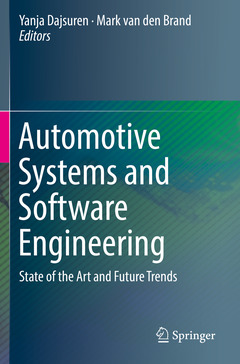Automotive Systems and Software Engineering, 1st ed. 2019 State of the Art and Future Trends
Coordonnateurs : Dajsuren Yanja, van den Brand Mark

Part I: Introduction.- Automotive Software Engineering: Past, Present, and Future.- Part II: Automotive Software Development.- Requirements Engineering for Automotive Embedded Systems.- Status Report on Automotive Software Development.- State-of-the-Art Tools and Methods Used in the Automotive Industry.- Part III: Automotive Software Reuse.- Software Reuse: From Cloned Variants to Managed Software Product Lines.- Variability Identification and Representation for Automotive Simulink Models.- Defining Architecture Framework for Automotive Systems.- Part IV: E/E Architecture and Safety.- The RACE Project: An Informatics-Driven Greenfield Approach to Future E/E Architectures for Cars.- Development of ISO 11783 Compliant Agricultural Systems: Experience Report.- Safety-Driven Development and ISO 26262.- Part V: C-ITS and Security.- Introduction to Cooperative Intelligent Transportation Systems.- In-Vehicle Networks and Security.- Security for V2X.- Intelligent Transportation System Infrastructure and Software Challenges.- Part VI: Future Trends.- Future Trends in Electric Vehicles Enabled by Internet Connectivity, Solar, and Battery Technology.- Autonomous Vehicles: State of the Art, Future Trends, and Challenges.
Date de parution : 08-2020
Ouvrage de 367 p.
15.5x23.5 cm
Date de parution : 07-2019
Ouvrage de 367 p.
15.5x23.5 cm
Disponible chez l'éditeur (délai d'approvisionnement : 15 jours).
Prix indicatif 126,59 €
Ajouter au panier

